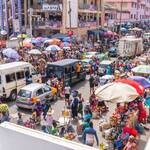Beyond politics: Ghana’s race against time to save its water bodies from the menace of illegal mining
Ghana stands on the brink of a nationwide water crisis. Once-flourishing rivers, which have nourished communities and fueled the agricultural backbone of the nation, are now turning into toxic, polluted streams due to illegal mining activities.
This environmental catastrophe, known locally as galamsey, has thrust the country into an ecological and public health crisis, pressing the government to act swiftly. However, as calls for action grow louder, the issue is becoming increasingly entangled in political gamesmanship, with some government officials viewing the mounting pressure as a politically motivated attack.
In recent months, a chorus of voices has united against galamsey. Civil society organizations, environmental activists, and even religious groups have joined forces, demanding an outright ban on illegal mining to halt the relentless assault on the nation’s water bodies and ecosystems. Now, the Catholic Archdiocese of Accra, alongside other faith-based groups, is stepping into the fray, organizing an “Environmental Prayer Protest Walk Against Galamsey.” This event, scheduled for Friday, October 11, will see participants marching through major landmarks in Accra, including Castle Road and Parliament House, to urge the government to declare a state of emergency on mining activities around rivers and forest reserves.
Faith-based Groups and Civil Society Lead the Charge
Faith-based organizations like the Catholic Church, often regarded as apolitical entities, have added weight to the environmental campaign. According to a press release issued on October 4 by the Catholic Archdiocese of Accra, the protest walk will serve as a prayerful plea for divine intervention while also urging policymakers to protect the environment. Galamsey, they argue, is not just an environmental issue but a moral one—a threat to God’s creation and the well-being of Ghana’s future generations.
As the country braces for the upcoming protest, Archbishop John Bonaventure Kwofie, leader of the archdiocese, emphasized, “This is not a matter of politics but of survival. Our rivers are dying, our children are drinking poison, and yet we remain divided on the issue.”
In a show of solidarity, the Trade Unions Congress (TUC) has announced a planned nationwide strike to pressure the government into banning illegal mining. The TUC’s Secretary-General, Dr. Yaw Baah, stated, “It is high time we prioritize our people’s health and future over economic gain or political expediency. The longer we wait, the worse the impact will be, and it will be the ordinary Ghanaian who pays the ultimate price.”
A Politically Charged Issue with Elections Looming
Despite the urgent pleas, political lines have been drawn, and the ruling government has taken a defensive stance, suggesting that the calls for a ban are part of a coordinated effort by opposition groups to gain leverage in the upcoming elections. With three months left until the polls, the government faces the unenviable task of balancing its response to the crisis with the optics of political neutrality. Certain government officials have even accused the faith-based groups and unions of timing their protests to weaken the government’s electoral position.
Yet, many Ghanaians see these assertions as deflective, arguing that the environmental crisis should transcend political calculations. Environmental advocate Prof. Kwasi Obiri commented, “The devastation we’re witnessing has no political color. It is the water we drink, the air we breathe, and the soil that grows our food. To view this issue solely through a political lens is to ignore the real suffering on the ground.”
A Holistic Approach Beyond Bans and Protests
While some voices advocate for an outright ban, others argue that tackling illegal mining requires a more comprehensive strategy. Legal experts and environmentalists have suggested that any policy designed to curb galamsey must include initiatives aimed at sustainable mining practices, community involvement, and stringent enforcement of existing laws. Dr. Sarah Owusu, a natural resources economist, pointed out, “Banning illegal mining is just one piece of the puzzle. We must look at the socio-economic drivers of galamsey and offer viable alternatives to those involved in this activity. Otherwise, a ban alone will only push them deeper underground.”
In rural communities where galamsey thrives, the activity often represents the only source of livelihood for struggling families. The Ghana Chamber of Mines has warned that a blanket ban without job retraining programs and alternative income sources would likely lead to economic hardships in these areas, inadvertently increasing poverty levels.
The Need for a National Consensus
As various groups prepare to march, strike, and protest, it is evident that the fight against galamsey will require more than sporadic campaigns and politically charged debates. Instead, what is needed is a national consensus, a unified approach that prioritizes environmental preservation above partisan politics.
There is hope that the upcoming protest walk will serve as a catalyst for this consensus. The planned route, which includes stops at Parliament House and Jubilee House, is symbolic of the bridge that needs to be built between policymakers and the public. By bringing together diverse stakeholders—faith-based groups, trade unions, environmentalists, and citizens from all walks of life—the march aims to send a clear message to the government: that the preservation of Ghana’s natural resources is a matter of national urgency, not political posturing.
As Ghanaians prepare to vote in the coming months, it is essential that all political actors recognize the importance of environmental conservation. The impending water crisis threatens not only the present population but also future generations. Failing to address this issue with urgency and sincerity would be a dereliction of duty by any government, regardless of its political affiliations.
Conclusion
Ghana’s water crisis is a defining issue of our time. The degradation of rivers, forests, and farmlands through illegal mining is pushing the nation towards an environmental tipping point. While the debate over how to address galamsey rages on, one thing is certain: the stakes are too high for inaction.
The upcoming Environmental Prayer Protest Walk and the planned TUC strike represent an opportunity for a diverse coalition to call for immediate, decisive action. This is a crucial moment for Ghanaians to come together, set aside political differences, and demand a comprehensive solution that protects the environment, sustains livelihoods, and secures a livable future for all. The time for action is now, and it is incumbent upon all stakeholders to prioritize the health of Ghana’s water bodies over political considerations.
The writer Daniel Nonor is a journalist focused on climate change, sustainability and environmental reporting. Email : danielnonor@ gmail.com)
- Tuesday, May 6, 2025 Newspaper Headlines - 6 May 2025
- Mahama unveils Code of Ethics for appointees - 5 May 2025
- No system breach, MoMo is safe, secure- MTN - 5 May 2025




